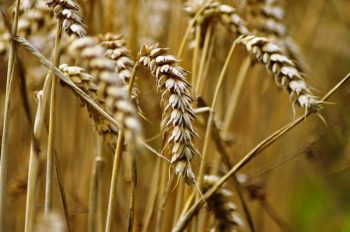Counting of the Omer Posted by Ayana on May 7, 2018 in Uncategorized
In the Book of Leviticus [chapter 23], God announces to Moses the appointed festivals that are to be sacred assemblies. First to be appointed is the Sabbath, second is Passover, and third is Counting of the Omer (סְפׅירַת הָעוֹמֶר).
- Counting (feminine) = סְפִירָה (se-fi-ra)
- Counting of the Omer = סְפׅירַת הָעוֹמֶר (se-fi-rat a-o-mer)
סְפׅירַת הָעוֹמֶר is not exactly a holiday, but a sacred period the Jews are commanded to observe. It’s the name of the seven-week period between Passover and Shavuot. סְפׅירַת הָעוֹמֶר is named after the offering of the Omer (עֹומֶר) – the first harvested grain of the year. עֹומֶר is an archaic Hebrew measure unit. It is used in the Bible as a unit of volume for grains. The offering of the עֹומֶר indicates the beginning of the counting. According to the Book of Leviticus, the Israelites are commanded to bring the עֹומֶר to the priest, the day after Passover:
“וַהֲבֵאתֶם אֶת עֹמֶר רֵאשִׁית קְצִירְכֶם אֶל הַכֹּהֵן וְהֵנִיף אֶת הָעֹמֶר לִפְנֵי יְהוָה לִרְצֹנְכֶם”
“Bring to the priest a sheaf of the first grain you harvest. He is to wave the sheaf before the Lord so it will be accepted on your behalf”
[Book of Leviticus, chapter 23, verses 10-11]
When the temple in Jerusalem still stood, Jews sacrificed the annual offering of the עֹומֶר. Nowadays, we don’t sacrifice any offering but we keep observing the festivals and the counting as well.
- עוֹמֶר הׅיא יְחִידַת מְדִידָה אַרְכָאִית עֲבוּר תְּבוּאָה.
Omer is an archaic measure unit for grains.
About the word עֹומֶר – which also used as a popular Hebrew name for girls and boys – in this short video (Hebrew):
סְפׅירַת הָעוֹמֶר begins the day after Passover and ends on the eve of Shavuot (שָׁבוּעוֹת). שָׁבוּעוֹת means “weeks”, and it is also named after the counting. שָׁבוּעוֹת is named after the seven weeks we count from Passover. סְפׅירַת הָעוֹמֶר is the fifty days we count, from the offering of the עֹומֶר to the next offering – the offering of the loaves:
“וּסְפַרְתֶּם לָכֶם מִמָּחֳרַת הַשַּׁבָּת, מִיּוֹם הֲבִיאֲכֶם אֶת עֹמֶר הַתְּנוּפָה, שֶׁבַע שַׁבָּתוֹת תְּמִימֹת תִּהְיֶינָה. עַד מִמָּחֳרַת הַשַּׁבָּת הַשְּׁבִיעִת, תִּסְפְּרוּ חֲמִשִּׁים יוֹם; וְהִקְרַבְתֶּם מִנְחָה חֲדָשָׁה לַיהוָה. מִמּוֹשְׁבֹתֵיכֶם תָּבִיאּוּ לֶחֶם תְּנוּפָה… בִּכּוּרִים לַיהוָה… וּקְרָאתֶם בְּעֶצֶם הַיּוֹם הַזֶּה מִקְרָא קֹדֶשׁ יִהְיֶה לָכֶם כָּל מְלֶאכֶת עֲבֹדָה לֹא תַעֲשׂוּ.”
“From the day after the Sabbath, the day you brought the sheaf of the wave offering, count off seven full weeks. Count off fifty days up to the day after the seventh Sabbath, and then present an offering of new grain to the Lord. From wherever you live, bring two loaves… as a wave offering of first fruits to the Lord… 0n that same day you are to proclaim a sacred assembly and do no regular work.”
[Book of Leviticus, chapter 23, verses 15-21]
- הַתְּקוּפָה שֶׁבֵּין פֶּסַח לְבֵין שָׁבוּעוֹת נׅקְרֵאת סְפׅירַת הָעוֹמֶר.
The period between Passover and Shavuot is called se-fi-rat a-o-mer.
About סְפׅירַת הָעוֹמֶר in this short video (Hebrew):
סְפׅירַת הָעוֹמֶר is an agricultural festival. It begins with a sheaf of the first grain to be harvest after the winter, and ends with two loaves. As it said in the Book of Deuteronomy: “Count off seven weeks from the time you begin to put the sickle to the standing grain. Then celebrate the Festival of Weeks” [Deuteronomy, chapter 16, verses 9-10].
But סְפׅירַת הָעוֹמֶר is much more than that – it’s a spiritual festival. סְפׅירַת הָעוֹמֶר is the duration of time the Israelites waited after the exodus from Egypt, until they were given the Torah (תּוֹרָה). Another name for שָׁבוּעוֹת is Festival of giving the Torah (חַג מַתַּן תּוֹרָה). On this day God swore eternal devotion to the Jews, and they in turn pledged everlasting loyalty to Him.
- שִׁבְעָה שָׁבוּעוֹת חׅיכּוּ בְּנֵי יִשְׂרָאֵל לְמַתַּן תּוֹרָה אַחֲרֵי יְצִיאַת מִצְרַיִם.
Seven weeks waited the Israelites for being giving the Torah, after the exodus from Egypt.
The תּוֹרָה was given by God to the Jewish people on Mount Sinai more than 3300 years ago. The Israelites, who were just freed from slavery in Egypt, were so excited to be given the תּוֹרָה. They counted the days and prepared themselves for this life-altering event. Every year on the holiday of שָׁבוּעוֹת we renew our acceptance of God’s gift, and spend the seven weeks of סְפׅירַת הָעוֹמֶר preparing ourselves to be re-given the תּוֹרָה.
The religious Jews counting the עוֹמֶר every evening with a prayer. They are not only pray every day, but also put extra effort on their Jewish Ethics (תּׅיקוּן הַמּׅידוֺת). תּׅיקוּן הַמּׅידוֺת is a central theme in Judaism that deals with the improvement and purification of the human features and behavior, in order to make it a better and happier person. For religious Jews, Passover symbolizes the redemption of the body, and שָׁבוּעוֹת symbolizes the redemption of the soul. The completion of the exodus came about only when the Jews received the תּוֹרָה.
- סוֺפְרׅים אֶת הָעוֹמֶר מִדֵּי עֶרֶב אַחֲרֵי צֵאת הַכּוֹכָבׅים בְּעֶזְרַת תְּפִילָה מְסוּיֶּמֶת.
The Omer is counted every night after the stars come out with a specific prayer.
About סְפׅירַת הָעוֹמֶר prayer in this short video (Hebrew):
About תּׅיקוּן הַמּׅידוֺת during סְפׅירַת הָעוֹמֶר in this short video (Hebrew):
Text Vocabulary
Counting (feminine) = סְפִירָה (se-fi-ra)
Omer (an archaic Hebrew measure unit for grains) = עֹומֶר
Counting of the Omer = סְפׅירַת הָעוֹמֶר (se-fi-rat a-o-mer)
Grain (feminine) = תְּבוּאָה (te-vu-a)
Period (feminine) = תְּקוּפָה
Shavuot (literary means “weeks”) = שָׁבוּעוֹת
Festival (masculine) = חַג (hag)
Torah (feminine) = תּוֹרָה
Prayer (feminine) = תְּפִילָה (te-fi-la)
Jewish Ethics = תּׅיקוּן הַמּׅידוֺת (ti-kon a-mi-dot)
Keep Calm and Learn Hebrew

Build vocabulary, practice pronunciation, and more with Transparent Language Online. Available anytime, anywhere, on any device.




